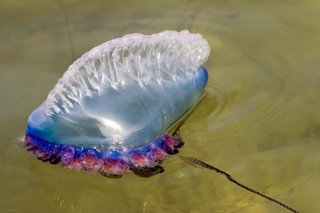Jellyfish and other sea creature stings
Most stings from sea creatures in the UK are not serious and can be treated with first aid. Sometimes you may need to go to hospital.What to do if you've been stung
Important: Get help if possible
If you've been stung by a sea creature such as a jellyfish, get local medical advice as soon as possible. You could ask a lifeguard or someone with first aid training for help.
If help is not available:
Non-urgent advice: Go to a minor injuries unit if:
- you've been stung by a sea creature and you have severe pain that is not going away
- you've been stung by a sea creature on your mouth or throat or near your eyes
- you've been stung by a stingray
- you've been stung by a sea creature in a tropical country
- you have a high temperature or a wound that does not get better after being stung by a sea creature while travelling outside the UK
Immediate action required: Go to A&E or call 999 if:
Information:
Do not drive to A&E. Ask someone to drive you or call 999 and ask for an ambulance.
Bring any medicines you take with you.
Symptoms of sea creature stings
The main symptoms of sea creature stings are intense pain where you're stung and an itchy rash.
Jellyfish and Portuguese man-of-war stings can also cause raised stripes on the skin (welts).
How to avoid sea creature stings
If you go in the sea there are things you can do to reduce the risk of being stung by a sea creature.
UK sea creatures that sting

Page last reviewed: 19 June 2024
Next review due: 19 June 2027